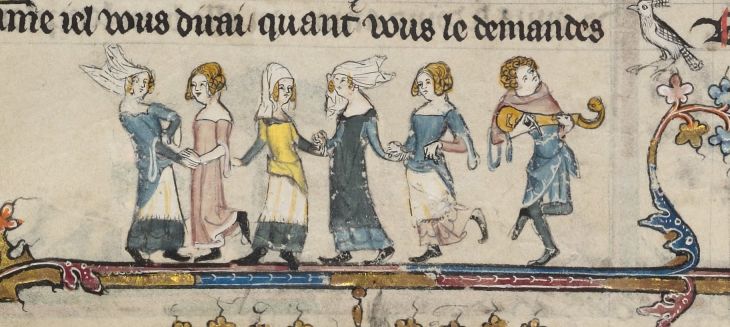Throughout the Middle Ages, minstrels travelled between fairs, taverns and baronial halls to entertain people with songs and stories.
Fictional minstrels are common in medieval literature but references to real-life performers are rare and fleeting. We have first names, payments, instruments played and occasionally locations, but until now virtually no evidence of their lives or work.
Dr James Wade, from the University of Cambridge’s English Faculty and Girton College, came across the texts by accident while researching in the National Library of Scotland. He then had a “moment of epiphany” when he noticed the scribe had written:
‘By me, Richard Heege, because I was at that feast and did not have a drink.’
“It was an intriguing display of humour and it’s rare for medieval scribes to share that much of their character,” Wade says. That made him investigate how, where and why Heege had copied out the texts.
Wade’s study, published in The Review of English Studies, focuses on the first of nine miscellaneous booklets in the ‘Heege Manuscript’ (National Library of Scotland, Advocates' MS 19.3.1).
This booklet contains three texts and Wade concludes that around the year 1480 Heege copied them from a now lost memory-aid written by an unknown minstrel performing near the Derbyshire-Nottinghamshire border.
The three texts comprise a tail-rhyme burlesque romance entitled The Hunting of the Hare; a mock sermon in prose; and The Battle of Brackonwet, an alliterative nonsense verse.
“Most medieval poetry, song and storytelling has been lost”, Wade says. “Manuscripts often preserve relics of high art. This is something else. It’s mad and offensive, but just as valuable.”
“Stand-up comedy has always involved taking risks and these texts are risky! They poke fun at everyone, high and low.”
The booklet’s secrets have been hiding in plain sight because, Wade believes, previous study has focused on how the manuscript was made and overlooked its comedic significance.
Wade connected multiple clues pointing to a minstrel’s repertoire. All three texts are humorous and designed for live performance – the narrator tells his audience to pay attention and pass him a drink. The texts all feature in-jokes to appeal to local audiences and show a playful awareness of the kind of diverse, celebrating audiences that we know minstrels performed to.
Wade thinks the minstrel wrote part of his act down because its many nonsense sequences would have been extremely difficult to recall. “He didn’t give himself the kind of repetition or story trajectory which would have made things simpler to remember,” Wade says.
“Here we have a self-made entertainer with very little education creating really original, ironic material. To get an insight into someone like that from this period is incredibly rare and exciting.”














